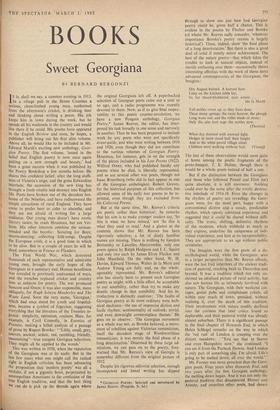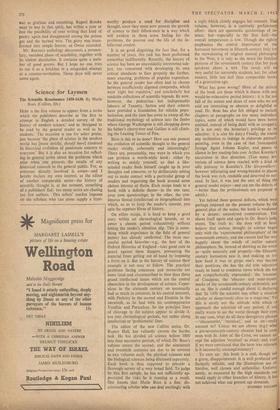BOOKS
Sweet Georgiana
By BERNARD BERGONZI
TT is, shall we say, a summer evening in 1913.
In a village pub in the Home Counties a serious, clean-limbed young man, sunburned from the afternoon's cricket, is drinking beer and thinking about writing a poem. His job keeps him in town during the week, but he spends all his weekends in the country and would live there if he could. His poems have appeared in the English Review and soon, he hopes, a Publisher will bring out his first slim volume. Above all, he would like to be included in Mr. Edward Marsh's exciting new anthology, Geor- gian Poetry. The first volume, 'issued in the belief that English poetry is now once again putting on a new strength and beauty,' had been a great success when it was published by the Poetry Bookshop a few months before. He shares this confident belief; after the long stuffi- ness of Victoria's reign, and the gross Edwardian interlude, the accession of the new king has brought a fresh vitality and decency into English life. Poets have broken out of the decadent hot- house of the Nineties, and have rediscovered the simple attractions of rural England. They have come to prefer beer or cider to absinthe, and they are not afraid of writing for a large audience. Our young man doesn't have exotic literary tastes; he reads Housman, but not Ver- laMe. His other interests combine the serious- minded and the bucolic: Scouting for Boys; morris-dancing; collecting folk-songs. Despite the European crisis, it is a good time in which to be alive. But in a couple of years he will be dead, somewhere in France or Flanders.
The First World War, which destroyed thousands of such representative and admirable young men, brought the early hopes of the Georgians to a summary end. Human beastliness was revealed in previously undreamed of ways, and the trenches replaced cricket and country inns as subjects for poetry. The war produced Sassoon and Owen; it was also responsible, more obliquely, for Hugh Selwyn Mauberley and The Waste Land. Soon the very name, 'Georgian,' which had once stood for youth and hopeful- ness, became a symbol of fogeyism, suggesting everything that the literature of the Twenties re- jected: simplicity, optimism, cosiness. Here, for example, is Cyril Connolly, in Enemies of Promise, making a lethal analysis of a passage of prose by Rupert Brooke: "Little, small, grey, uneven, ancient, sedate, red, rambling, friendly, unassuming"—true escapist Georgian 'adjectives. They might all be applied to the womb.'
This was written in 1938, when the reputation of the Georgians was at its nadir. But in the last few years what one might call the radical right in English criticism has been advancing the proposition that 'modern poetry' was all a mistake, if not a gigantic hoax, perpetuated by cosmopolitan Americans to the confusion of the true English tradition, and that the best thing We can do is pick up the threads again where
the original Georgians left off. A paperbackcd selection of Georgian poets came out a year. or so ago, and a radio programme was recently devoted to them. Now, as if to give final respec- tability to this poetic counter-revolution, we have a new Penguin anthology, Georgian Poetry.* James Reeves, the editor, has inter- preted his task broadly in one sense and narrowly in another. Thus he has been prepared to include work by any poets who were not specifically avant-garde, and who were writing between 1910 and 1920, even though they did not contribute to the various volumes of Georgian Poetry. Housman, for instance, gets in on the strength of the pieces included in his Last Poems (1922). Wilfred Owen, who had published hardly any poems when he died, is liberally represented, and so are several other war poets, though not Isaac Rosenberg (who did in fact appear in one of the Georgian anthologies). Robert Graves, for the historical purposes of this collection, has allowed some of his early war poems to be re- printed, even though they are excluded from his Collected Poems.
But at the same time, Mr. Reeves's criteria are poetic rather than historical: he remarks that his aim is to make younger readers say, `So this is what we have missed,' not `So this is what they used to read.' And a glance at the contents shows that Mr. Reeves has been rigorously selective; a lot of dimly familiar names are missing. There is nothing by Gordon Bottomley or Lascelles Abercrombie, only one poem apiece by Ralph Hodgson and J. C. Squire and only two each by James Elroy Flecker and John Masefield. On the other hand, W. H. Davies, Edward Thomas, Walter de la Mare and Andrew Young are fully and, on the whole, agreeably represented. Mr. Reeves's editorial aim has clearly been to present such Georgian poetry as might, with a little effort, be acceptable to our sensibility, rather than try to make any drastic change in that sensibility. And his in- troduction is distinctly cautious: 'The faults of Georgian poetry at its most ordinary were tech- nical slackness—the use of imprecise diction and facile rhythm; sentimentality of outlook; trivial, and even downright commonplace themes.' He goes on to observe: 'The Georgian movement as a whole was not, as Brooke believed, a move- ment of rebellion against Victorian romanticism, itself the decadent stage of Wordsworthian romanticism; it was merely the final phase of a long deterioration.' Disarmed by these large ad- missions, we can pass on to the poetry, fore- warned that Mr. Reeves's view of Georgia is somewhat different from the original picture of 1912.
Despite his rigorous editorial selection, enough incompetent and banal writing has slipped
* GEORGIAN POETRY. Selected and introduced by James Reeves. (Penguin, 3s. 6d.)
through to show one just how bad Georgian poetry could be, given half a chance. This is evident in the poems by Flecker and Brooke (of whom Mr. Reeves sadly concedes, 'whatever importance Brooke's poetry retains is largely historical'). These, indeed, show 'the final phase of a long deterioration.' But there is also a good deal of solid if mostly minor achievement. The best of the nature poetry—that which takes the trouble to look at natural objects, instead of merely enthusing over them—occasionally shows interesting affinities with the work of those more advanced contemporaries of the Georgians, the Imagists:
Dry August burned. A harvest hare
Limp on the kitchen table lay, Its fur blood-blubbered, eyes astare. . . .
(de la Mare) Tali nettles cover up, as they have done These many springs, the rusty harrow, the plough Long worn out, and the roller made of stone: Only the elm butt tops the nettles now.
(Thomas) When day dawned with unusual light, Hedges in snow stood half their height And in the white-paved village street Children were walking without feet. (Young)
The last of these observations would seem quite at home among the poetic fragments of the proto-Imagist, T. E. Hulme, though there it would be a whole poem instead of half a one.
But if the distinction between the Georgians and those who followed Pound and Eliot isn't quite absolute, it is still enormous. Nothing could ever be the same after the totally /destruc- tive interlude of 1914-18. Even the changes in the rhythm of poetry are revealing; the Geor- gians were, for the most part, happy with a conventional diction and a steady, predictable rhythm, which openly conveyed experience and suggested that it could be shared without diffi- culty. The ironic, shifting, defensive rhythms of the moderns, which withhold as much as they express, underline the uniqueness of indi- vidual experience, and hint at its inexpressibility. They are appropriate to an age without public certainties.
The Imagists were the first poets of a de- mythologised world, while the Georgians, seen in a larger perspective than Mr. Reeves affords, were the last frail inheritors of the ancient tradi- tion of pastoral, reaching back to Theocritus and beyond. It was a tradition which not only en- shrined an idealised picture of rural activity, but also saw human life as intimately involved with nature. The Georgians, with their weekend cot- tages, genial pubs and complaisant yokels, all within easy reach of town, presided, without realising it, over the death of this tradition. Their involvement with nature readily declined into the cosiness that later critics found so deplorable, and their pastoral world was already almost suburban. There is a significant passage in the final chapter of Howards End, in which Helen Schlegel remarks on the way in which the 'red rust' of London is creeping over the distant meadows: ""You see that in Surrey and even Hampshire now," she continued. "I can see it from the Purbeck Downs. And London is only part of something else, I'm afraid. Life's going to be melted down, all over the world."' Mr. Forster was more prescient than the Geor- gian poets. Four years after Howards End, and two years after the first Georgian anthology, the melting down began. And it was not only the pastoral .tradition that disappeared. Homer and Ariosto, and countless other poets, had shown
war as glorious and ennobling. Rupert Brooke went to war in that spirit, but within a year or two the possibility of ever writing that kind of poetry again had disappeared among the poison gas and the barbed wire. The glory was trans- formed into simple horror, as Owen recorded.
Mr. Reeves's anthology documents a momen- tary, vanished phase of sensibility, together with its violent dissolution. It contains quite a num- ber of good poems. But I hope no one tries to use it as a brickbat in a misguided attempt at a counter-revolution. Those days will never come again.



































 Previous page
Previous page